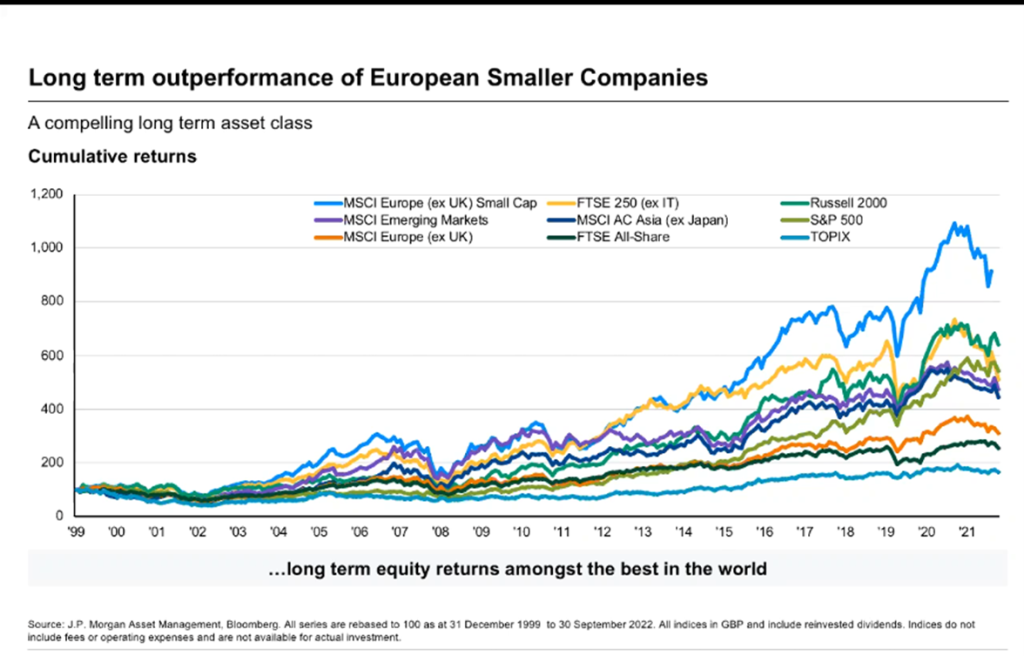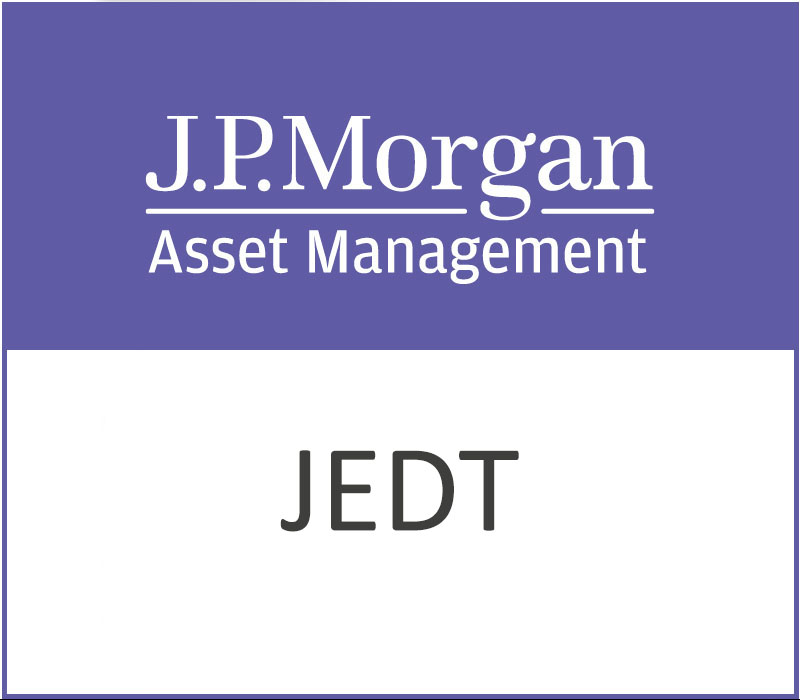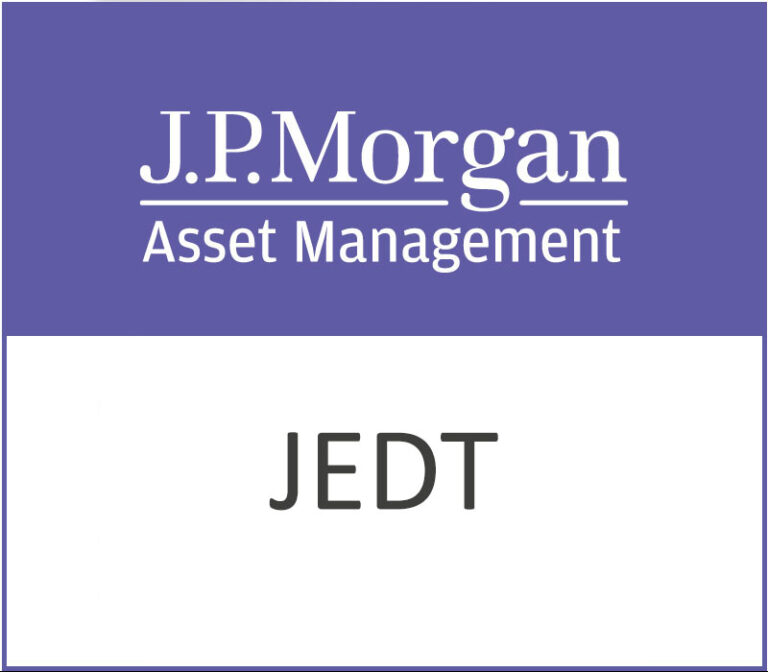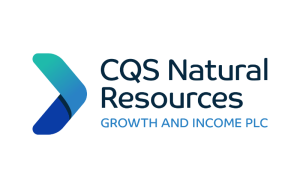DirectorsTalk interviewed Edward Greaves, Portfolio Manager for JPMorgan European Discovery Trust plc (LON: JEDT) to discuss the investment case for European smaller companies, current valuations in the sector as well as long-term themes within the portfolio for this Europe investment fund.
Q1. Edward, why should investors look at European smaller companies now?
Well, in my view, we mustn’t lose track of the bigger picture, we shouldn’t forget that European small caps have been one of the best performing asset classes for decades and this surprises many people.

This chart shows the long term performance of the investment trust’s benchmark versus a number of global equity indices since 2000. The benchmark is in blue and you can see that it has outperformed all of the other major indices over this period and we show reinvested dividends in pound sterling.
This is due to the superior growth of European small caps. Small caps are more entrepreneurial, more dynamic, they’re more nimble, they’re able to very quickly recognise and exploit new themes or trends.
At the same time, current valuations are very attractive. The price to book ratio of our benchmark is really low – it’s approaching the levels seen at the peak of the global financial crisis and the Eurozone sovereign debt crisis. This is similar when you look at the price to book ratio of European small caps versus large caps.
Q2. Can you put the performance of European small caps in a historical context?
The evidence shows small caps tend to underperform during a global crisis and this is when risk premiums increase. At this point, central banks step in to support the economy and small caps stage rapid recoveries. This whole process was very much accelerated through COVID-19 when central banks stepped in really quickly and small caps actually outperformed for the year.
Year-to-date, small caps have underperformed[1] significantly versus large caps but at the same time, forward economic indicators are now very very poor, approaching levels where central banks have stepped up support historically.
As soon as sentiment turns more positive, I would expect that small caps would stage a very good rally especially given the long-term outperformance of the asset class and the depressed valuations that we see currently.
Q3. Can you remind investors of the investment trust’s investment process.
Of course. We look to uncover hidden gems before the wider investing community does and many of the small caps that we have invested in have gone on to become large caps or have been acquired by larger companies.
Our investment strategy focusses on three characteristics: value, quality and momentum. So, just to take each of these in turn.
- Value – We really focus on free cash flow yield because we believe this is the highest quality valuation metric. We think cash is king, cash is needed for investments and cash is needed for dividends. We look for earnings recovery potential so for example, catalysts and we want some intrinsic quality, we don’t want to be investing in price taking commodities as these often turn out to be value traps.
- Quality – We want companies that are market leaders in niches, we want high pricing power, low capex requirements so in other words, high return on invested capital. We’re looking for very strong balance sheets and importantly, we want management teams with proven track records and efficient capital allocation. We meet hundreds of companies every year and the CEO’s/CFO’s are often the company founders themselves and this gives us a clearer understanding of their capital allocation decision process and management tools. We believe this is an extremely important part of the investment process.
- Momentum – We’re looking for companies where we see future earnings potential not reflected in expectations. This could be due to the structural growth of the end markets for example, aging populations, it could be that the company has a disruptive technology that’s gaining market share or it could be companies that operate in fragmented markets and have a track record of successful bolt-on acquisitions, this allows them to consolidate the market.
Importantly, it’s difficult to find companies that look great for all three characteristics so we look for companies that score well for at least two of these and we ensure that the overall portfolio is bias towards all three of them, this ensures we have a balanced portfolio. We’ve got both very exciting growth companies and we’ve got attractively valued companies with strong earnings recovery potential.
- Can you highlight some of the themes that emerge from your investment strategy?
We have a big exposure to renewable energy, electrification, and environmental protection via companies such as:
- Spie, which is an installation company heavily exposed to the energy transition theme,
- Erg, which is a renewable energy generation company,
- Nexans, which is a global leader in high voltage cables which are vital to connecting renewable energy to the grid and upgrading the grid itself to cope with more volatile supply and demand,
- Arcadis, which is an engineering consultant focussed on buildings, infrastructure, environment, and water.
We also have exposure to leisure activities after COVID lockdowns have ended via companies such as Kinepolis which is an exceptionally well run cinema chain and importantly, has a very strong balance sheet.
We have many companies exposed to technological disruption such as:
- Melexis which is a beneficiary of every-growing semi-conductor content for cars, and this should support continued double-digit growth going forward,
- Reply is an IT consultant focussed on themes such as big data, artificial intelligence and cyber security which all companies have to invest in, regardless of the sector they operate in,
- Medtech diagnostics company, DiaSorin, which is benefitting from aging populations and the growing importance of diagnostics testing.
From this, you can see another benefit of small cap investing which is the ability to get pure exposure to many different, exciting, new growth themes.
So, just to summarise, whilst the short term economic outlook is very uncertain, we like to focus on the fact that European small caps as an asset class has a great long-term track record, it’s very cheap versus history and this trust has a very experience management team and a disciplined investment process.
JPMorgan European Discovery Trust plc (LON:JEDT) aims to provide capital growth from a diversified portfolio of smaller European companies (excluding the United Kingdom).
For more information, please visit the JPMorgan European Discovery Trust plc website: https://am.jpmorgan.com/gb/en/asset-anagement/per/products/jpmorgan-european-discovery-trust-plc-ordinary-shares-gb00bmts0z37
Important Information
Investment objectives: The Company aims to provide capital growth from a diversified portfolio of smaller European companies (excluding the United Kingdom). As the emphasis is on capital growth rather than income, shareholders should expect the dividend to vary from year to year. The Company has the ability to use borrowing to gear the portfolio within the range of 20% net cash to 20% geared, in normal market conditions.
Key Risks: Exchange rate changes may cause the value of underlying overseas investments to go down as well as up. External factors may cause an entire asset class to decline in value. Prices and values of all shares or all bonds and income could decline at the same time, or fluctuate in response to the performance of individual companies and general market conditions. This Company may utilise gearing (borrowing) which will exaggerate market movements both up and down. This Company invests in smaller companies which may increase its risk profile. The share price may trade at a discount to the Net Asset Value of the Company.
Opinions, estimates, forecasts, projections and statements of financial market trends are based on market conditions at the date of the publication, constitute our judgment and are subject to change without notice. There can be no guarantee they will be met.
[1] Source: J.P. Morgan Asset Management, Bloomberg. As of September 2022. Before 2022, the comparison was between EMIX smaller European Companies (ex UK) Index vs. MSCI Europe (ex UK) Index, and since then, MSCI Europe Small Cap (ex UK) Index vs MSCI Europe (ex UK) Index. All indices in GBP and include reinvested dividends. Indices do not include fees or operating expenses and are not available for actual investment. The indices used are based on data availability and changes to internal system’s data source.









































